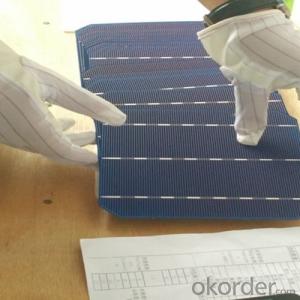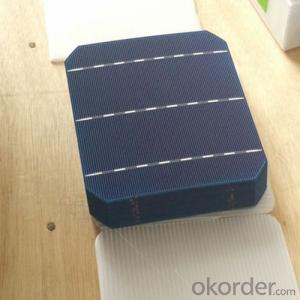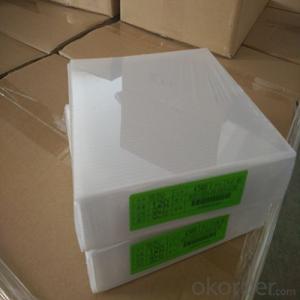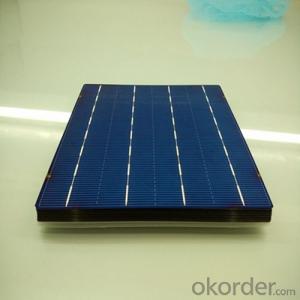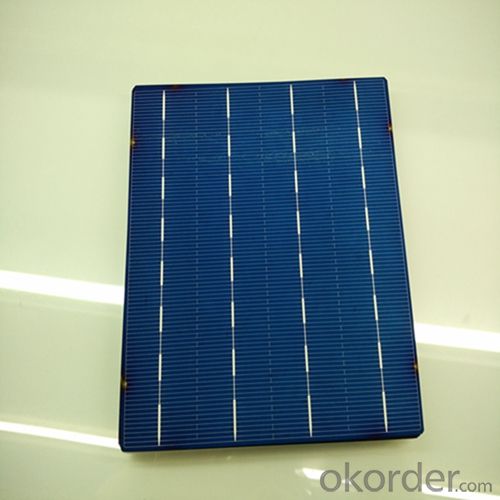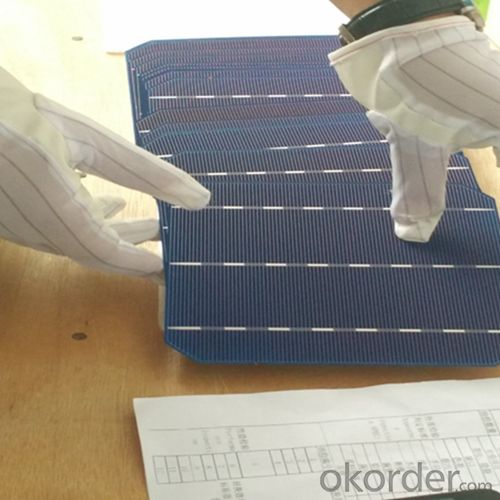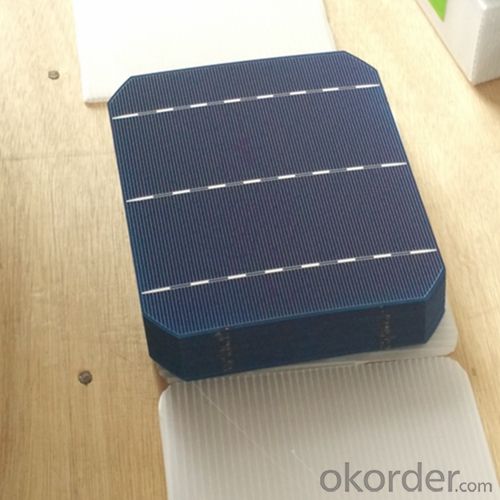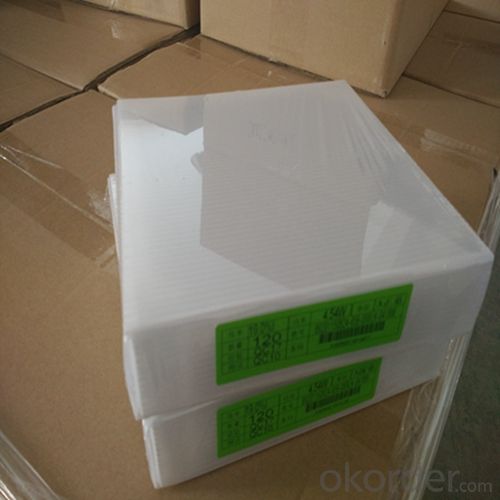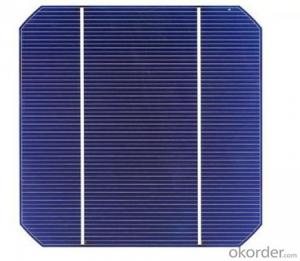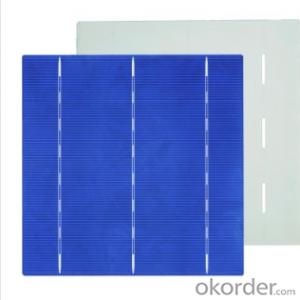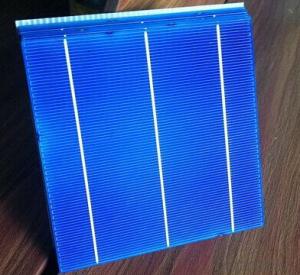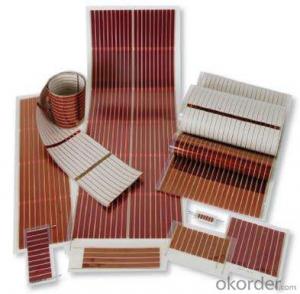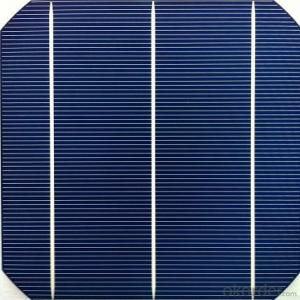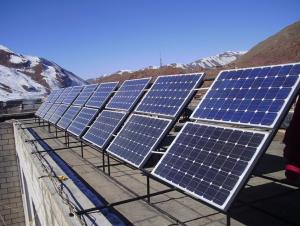Gallium Arsenide Solar Cells Price - Poly 156x156mm2 Grade A Solar Cells
- Loading Port:
- Shanghai
- Payment Terms:
- TT OR LC
- Min Order Qty:
- 4999 watt
- Supply Capability:
- 6000000 watt/month
OKorder Service Pledge
OKorder Financial Service
You Might Also Like
The operation of a photovoltaic (PV) cell requires 3 basic attributes:
The absorption of light, generating either electron-hole pairs or excitons.
The separation of charge carriers of opposite types.
The separate extraction of those carriers to an external circuit.
In contrast, a solar thermal collector supplies heat by absorbing sunlight, for the purpose of either direct heating or indirect electrical power generation from heat. A "photoelectrolytic cell" (photoelectrochemical cell), on the other hand, refers either to a type of photovoltaic cell (like that developed by Edmond Becquerel and modern dye-sensitized solar cells), or to a device that splits water directly into hydrogen and oxygen using only solar illumination.Characteristic of Mono 156X156MM2 Solar Cells
You are gaining energy independence - add battery backup power for even greater energy security
The cost of electricity is only going to rise – insure against that rising cost
Adaptive cells change their absorption/reflection characteristics depending to respond to environmental conditions. An adaptive material responds to the intensity and angle of incident light. At the part of the cell where the light is most intense, the cell surface changes from reflective to adaptive, allowing the light to penetrate the cell. The other parts of the cell remain reflective increasing the retention of the absorbed light within the cell.[67]
In 2014 a system that combined an adaptive surface with a glass substrate that redirect the absorbed to a light absorber on the edges of the sheet. The system also included an array of fixed lenses/mirrors to concentrate light onto the adaptive surface. As the day continues, the concentrated light moves along the surface of the cell. That surface switches from reflective to adaptive when the light is most concentrated and back to reflective after the light moves along
Mechanical data and design
Format | 156mm x 156mm±0.5mm |
Thickness | 210μm±40μm |
Front(-) | 1.5mm bus bar (silver),blue anti-reflection coating (silicon nitride) |
Back (+) | 2.5mm wide soldering pads (sliver) back surface field (aluminium) |
Temperature Coefficient of Cells
Voc. Temp.coef.%/K | -0.35% |
Isc. Temp.coef .%/K | +0.024%/K |
Pm.Temp.coef. %/K | -0.47%/K |
Electrical Characteristic
Effiency(%) | Pmpp(W) | Umpp(V) | Impp(A) | Uoc(V) | Isc(A) | FF(%) |
18.35 | 4.384 | 0.526 | 8.333 | 0.63 | 8.877 | 78.39% |
18.20 | 4.349 | 0.526 | 8.263 | 0.63 | 8.789 | 78.54% |
18.05 | 4.313 | 0.525 | 8.216 | 0.63 | 8.741 | 78.32% |
17.90 | 4.277 | 0.524 | 8.161 | 0.625 | 8.713 | 78.04% |
17.75 | 4.241 | 0.523 | 8.116 | 0.625 | 8.678 | 77.70% |
17.60 | 4.206 | 0.521 | 8.073 | 0.625 | 8.657 | 77.36% |
17.45 | 4.170 | 0.519 | 8.039 | 0.625 | 8.633 | 76.92% |
17.30 | 4.134 | 0.517 | 8.004 | 0.625 | 8.622 | 76.59% |
17.15 | 4.096 | 0.516 | 7.938 | 0.625 | 8.537 | 76.80% |
17.00 | 4.062 | 0.512 | 7.933 | 0.625 | 8.531 | 76.18% |
16.75 | 4.002 | 0.511 | 7.828 | 0.625 | 8.499 | 75.34% |
16.50 | 3.940 | 0.510 | 7.731 | 0.625 | 8.484 | 74.36% |
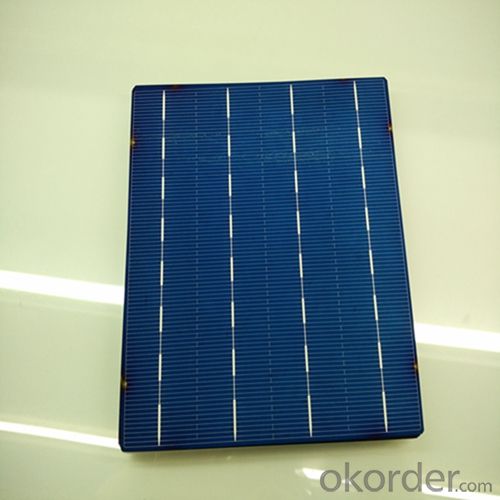
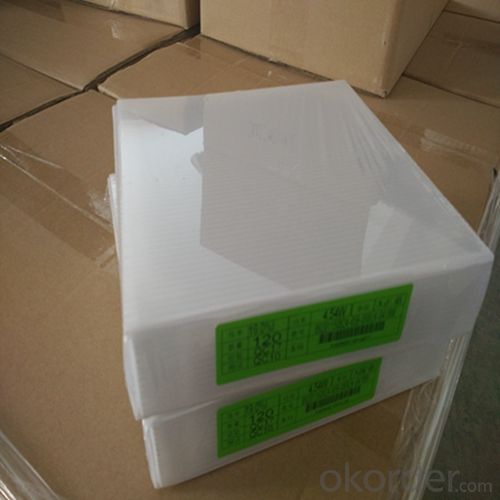
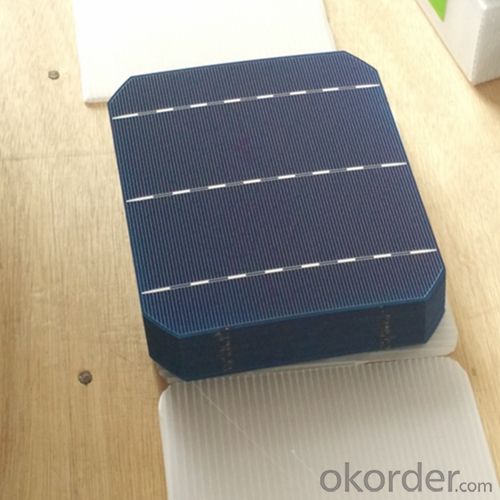
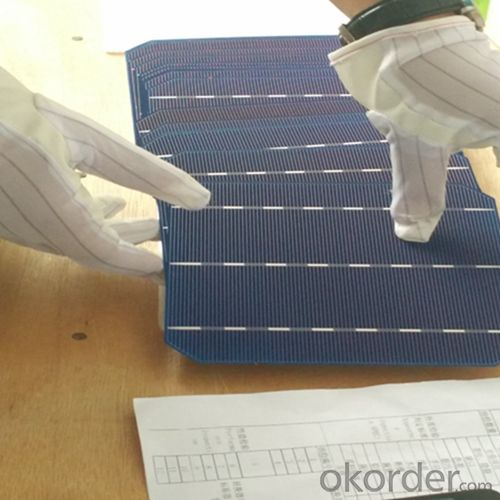
 FAQ
FAQ
Q: What price for each watt?
A: It depends on the quantity, delivery date and payment terms, generally Large Quantity and Low Price
Q: What is your size for each module? Can you tell me the Parameter of your module?
A: We have different series of panels in different output, both c-Si and a-Si. Please take the specification sheet for your reference.
Q: What is your size for each module? Can you tell me the Parameter of your module?
A: We have different series of panels in different output, both c-Si and a-Si. Please take the specification sheet for your reference.
- Q: How do solar cells perform in high-pollution areas?
- Solar cells perform less efficiently in high-pollution areas due to the reduced amount of sunlight reaching the cells. The presence of pollutants in the air, such as smog or dust, can block and scatter sunlight, thereby decreasing the overall energy output of the solar cells. Regular cleaning and maintenance of the panels can help mitigate the impact of pollution on their performance.
- Q: What is the maintenance required for solar cells?
- The maintenance required for solar cells primarily involves regular cleaning to remove any dirt, debris, or grime that may accumulate on the surface of the panels. Additionally, it is important to inspect the panels for any damage, such as cracks or loose connections, and address them promptly to ensure optimal performance. Other routine maintenance tasks include checking the inverters, monitoring the system's performance, and keeping the surrounding area free from shading objects. Overall, solar cell maintenance is relatively minimal compared to other energy sources, making it a cost-effective and sustainable choice for power generation.
- Q: Can solar cells be used to power an entire household?
- Yes, solar cells can be used to power an entire household. With advancements in solar technology and proper installation, a solar power system can generate enough electricity to meet the energy needs of a household, especially when combined with energy storage solutions. However, the feasibility and effectiveness of using solar cells to power an entire household depend on various factors such as the size of the solar system, energy consumption patterns, geographic location, and available sunlight.
- Q: What is the impact of solar cells on reducing energy poverty?
- Solar cells have a significant impact on reducing energy poverty by providing access to clean and affordable electricity in remote and underserved areas. By harnessing the power of the sun, solar cells offer a sustainable and renewable energy solution, eliminating the reliance on fossil fuels and costly infrastructure. This empowers communities to meet their energy needs, improve living conditions, and promote economic growth while reducing greenhouse gas emissions and combating climate change.
- Q: What are the environmental impacts of solar cell production?
- The environmental impacts of solar cell production include the extraction and processing of raw materials, such as silicon, which can contribute to habitat destruction and water pollution. The manufacturing process itself requires energy and generates greenhouse gas emissions. Additionally, the disposal of old or damaged solar cells can pose challenges due to their composition and potential for toxic waste. However, when compared to the environmental impacts of fossil fuel-based energy production, solar cell production is generally considered to be much less harmful.
- Q: Can solar cells be used in residential communities?
- Yes, solar cells can be used in residential communities. They are a sustainable and renewable energy source that can be installed on rooftops or in open spaces to generate electricity for individual homes or shared community buildings. Solar energy can help reduce reliance on grid-supplied electricity, lower energy bills, and contribute to a cleaner and greener environment. Additionally, advancements in solar technology have made it more efficient and cost-effective, making it an increasingly popular option for residential communities.
- Q: Can solar cells be used in remote areas with no access to electricity?
- Yes, solar cells can be used in remote areas with no access to electricity. Solar cells convert sunlight into electricity, making them a reliable and sustainable source of power in areas where grid connectivity is absent. They are particularly well-suited for remote locations due to their portability, low maintenance requirements, and ability to generate electricity even in harsh environmental conditions.
- Q: Can solar cells be used for powering electric vehicle charging stations with battery storage?
- Yes, solar cells can be used to power electric vehicle charging stations with battery storage. Solar cells convert sunlight into electricity, which can be used to charge electric vehicle batteries directly or stored in batteries for later use. This allows for a cleaner and sustainable way to power electric vehicle charging stations, reducing dependence on fossil fuels.
- Q: Can solar cells be used on backpacks or camping gear?
- Yes, solar cells can be used on backpacks or camping gear. These portable solar panels can be attached to backpacks, tents, or other camping gear to harness solar energy and charge devices such as smartphones, GPS devices, or portable speakers while on the go. This allows campers and hikers to have a reliable source of power in remote locations and reduces the need for carrying extra batteries or relying on traditional power sources.
- Q: Can solar cells be used for powering desalination plants?
- Yes, solar cells can be used for powering desalination plants. Solar energy can be harnessed through photovoltaic panels, which convert sunlight into electricity. This electricity can then be used to power the desalination process, where saltwater is converted into freshwater through various methods such as reverse osmosis or distillation. Utilizing solar cells for powering desalination plants offers a sustainable and renewable energy source, reducing reliance on fossil fuels and minimizing the environmental impact of the desalination process.
Send your message to us
Gallium Arsenide Solar Cells Price - Poly 156x156mm2 Grade A Solar Cells
- Loading Port:
- Shanghai
- Payment Terms:
- TT OR LC
- Min Order Qty:
- 4999 watt
- Supply Capability:
- 6000000 watt/month
OKorder Service Pledge
OKorder Financial Service
Similar products
Hot products
Hot Searches
Related keywords

